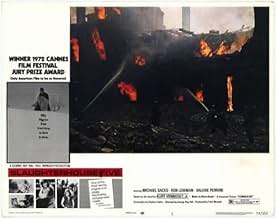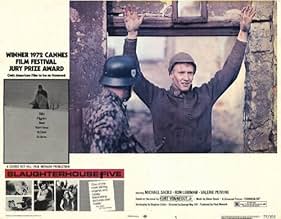It makes an eloquent statement about how traumatic moments in our life stay with us as if it 'just happened yesterday'. What makes this film so appealing is how it depicts what would happen if you could jump around your entire life. When the future influences the past, it takes on a great significance. Billy Pilgrim is a humdrum Optometrist who nevertheless has an exciting life, surviving the bombing of Dresden in WW2, living through a plane crash, and being transported to another planet. Yet he maintains to be humble. As we follow Billy's life, the portrait of mediocre America is a touching contrast to the other moments that are frightening. He knows how he will die, and in the process becomes unafraid to live life to it's fullest. The inhabitants of the planet Tralfamador (??) say it is best to concentrate on the good moments in your life, and not so much on the bad. But they are still there, and you cannot erase that moment of your life. In essence, the true moral of this film is to accept all that has happened in your life. For if you don't, you deny the validity of your existence. When Billy finally writes about his adventures, others have a chance to learn about the world and themselves that would've otherwise been denied.
Technically, the film uses the moments where Billy jumps in time as meaningful transitions. It interweaves lessons learned from one part of his life and applies it to the present moment (whenever that is). The film's real treasures are the supporting characters that surround Billy. It also vividly transports you to WW2, a semi-autobiographical account of Kurt Vonnegut's real life experiences in Dresden. The film is filled with anecdotes that present the film's other main theme, that life is indeed ironic.
I was deeply touched by this film, with it's ability to whisk you from scenes of horror to amusing 'Kodak moments'. The music poignantly represents these transitions, and helps to carry the film. In the end, you can accept his death, by having lived his life.


























